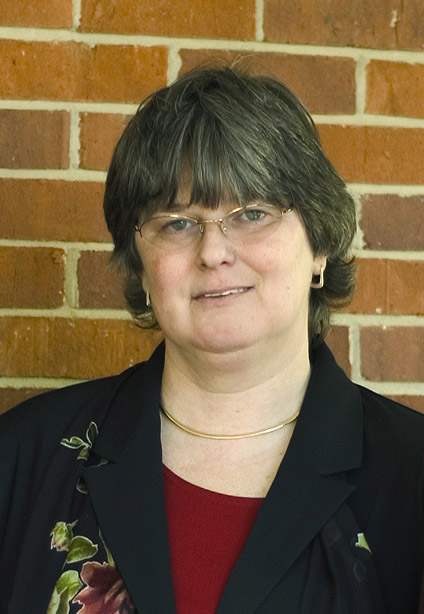Contact: Phil Hearn

Stephanie Doane
The Navy needs a few good brains and the research work of a Mississippi State psychologist could go a long way in matching the mental acuity of sailors and pilots to the sophisticated, high-skill jobs to which they are assigned.
Psychology professor Stephanie Doane, director of the university's Institute for Neurocognitive Science and Technology, is using digital eye-tracking technology to help the Navy better understand how humans process information and adapt to complex, constantly changing circumstances--particularly in crucial aviation and submarine operations.
"The Navy is computerizing tests and wants to find a way to assess how individual cognitive and social abilities impact team performance in a real-time, dynamically changing environment," said Doane, who has amassed a dozen U.S. Office of Naval Research grants totaling nearly $5 million since joining the MSU faculty in 1999.
"How do the things we're processing in our head actually determine what we attend to in this environment?" she posed. "How can I make you shift what you're doing when you're in a real-time environment? We track performance through eye movements while another computer models human thinking."
With four of the current ONR grants totaling more than $1.7 million and an additional $82,000 from the Navy Submarine Medical Research Laboratory, the MSU institute utilizes a digital eye-tracking headpiece--with camera, mirrors and computer interface--to measure how a human's cognitive skills relate to learning and performance.
The initial stage of one $220,000 project, just completed for the Navy Personnel Research and Technology unit at Millington, Tenn., featured the design of "first-person shooter game" computer software that tests individual and three-member team responses to simulated neutral and hostile subjects in a "real-time, dynamic environment."
"All actions and reactions are logged on the computer, and we do all kinds of analyses," explained Doane. "We relate differences in social and cognitive abilities to an individual's ability to function, and to the team's performance as a whole."
"I've learned a lot about team performance. It's a difficult task, but definitely worthwhile," said Sally Gilbert of Starkville. A rising senior at the Mississippi School for Mathematics and Science in Columbus, she's assisting with INST project analysis this summer.
Another $450,000 project, now in its third year, involves the development of computational models, or artificial intelligence, to examine how humans actually process information in real time. The use of Personal Computer-Aided Training Devices provides flight-simulation exercises for the training of civilian and military pilots.
"When you're flying a plane, you're in a real-time environment," said Doane. "Whatever you do changes that environment. Eye movements, control movements, flight performance, and specific flight situations are used by the computer model to explain and predict real-time human performance in a dynamic task environment.
"With a cognitive model based in part on eye movements--an eye-tracker actually following the operator's pupil--we hope to augment cockpit intelligence," she added. "You can actually log real flight hours on this."
Mark Jodlowski of Chicago, a Mississippi State doctoral student in applied cognitive science, watched as recent MSU computer science graduate Ben Craig of Gulfport tested his skills on the flight-simulation device.
"As he looks at different instruments, it tracks the reflection of his pupil, the exact position of where the eye is looking at a given point in time. Whoops! He just crashed the plane," said Jodlowski.
A third $421,000 research project, now in its second year, is designed to help sonar and radar operators more quickly and efficiently identify enemy aircraft and vessels through visual scanning--first utilizing abstract figures, then moving to the actual silhouettes of potential targets.
"This is to eliminate the likelihood of shooting down the wrong aircraft because, on a screen, someone didn't differentiate the friendly plane from the enemy plane," explained Doane. "It's called augmenting cognition."
ONR provided $600,000 to Doane and the Naval Aerospace Medical Research Laboratory at Pensacola, Fla., and the Naval Submarine Medical Research Laboratory added $82,000 for a fourth INST research project to devise tests aimed at assessing memory capacity and situation awareness capabilities--particularly for pilots and submarine navigators.
"We're assessing people the Navy has recruited," Doane said. "We're looking at working and long-term memory capacity and how that affects their ability to project forward to a future state. We think it's critical in order to build and maintain situation awareness--or how to keep track of where you are.
"The mental understanding of the environment must match the reality," she said.
The MSU institute was established earlier this year to conduct multidisciplinary research, teaching and service in the areas of cognitive science and medical systems. Julie Jodlowski serves as institute coordinator.
Doane formerly directed MSU's Skill Acquisition Laboratory in the psychology department. She holds bachelor's and master's degrees in experimental psychology, respectively, from the University of California, Santa Barbara, and Villanova University; and a doctorate in cognitive psychology from California-Santa Barbara. She also has conducted post-doctoral training at the Institute of Cognitive Science, University of Colorado, Boulder.
NEWS EDITORS/DIRECTORS: For more information, contact Dr. Doane at (662) 325-4718 or 325-7212 or Stephanie Doane.